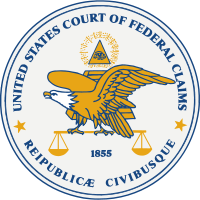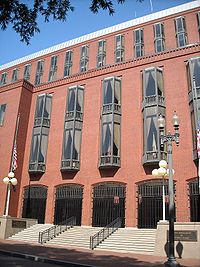- United States Court of Federal Claims
-
The United States Court of Federal Claims (in case citations, Fed. Cl. or C.O.F.C.) is a United States federal court that hears monetary claims against the U.S. government. The court is established pursuant to Congress's authority under Article One of the United States Constitution. Unlike judges of courts established under Article Three of the United States Constitution, judges on the Court of Federal Claims do not have life tenure (see Article I and Article III tribunals). Instead they serve for 15-year terms[1] and are eligible for reappointment. The sixteen judges of the court are nominated by the President and confirmed by the Senate.[2]
The court house of the Court of Federal Claims is situated in the Howard T. Markey National Courts Building (on Madison Place across from the White House) in Washington, D.C.
Contents
History
The court was formed on October 1, 1982, as the United States Claims Court (in case citations, Cl. Ct.) and it is a successor to the trial division of the United States Court of Claims. The National Childhood Vaccine Injury Act of 1986 gave the court the authority to create an Office of Special Masters to receive and hear certain vaccine injury cases, and the jurisdiction to review those cases. On October 28, 1992, the name of the court was changed to the United States Court of Federal Claims.[3]
Jurisdiction
The court has special jurisdiction, spelled out in 28 U.S.C. § 1491: it hears claims for money that arise from the United States Constitution, federal statutes, executive regulations, or an express or implied in fact contract with the United States Government, most notably under the Tucker Act. The court has concurrent jurisdiction with U.S. district courts, when the claim is for less than $10,000, by the provisions of 28 U.S.C. § 1346. Claims have a statute of limitations of six years from the time the claim first accrues [4]. This limitation is strictly construed by the court.
The court has concurrent jurisdiction involving contracts with the federal government, where a contractor has the option of choosing between filing suit with the court or with the agency Board of Contract Appeals. The general rule is that a contractor may either 1) file suit within 90 days with the agency Board of Contract Appeals or 2) file suit within one year with the court. A contractor, however, must choose which forum in which to file; a contractor cannot file suit with both the agency Board and with the court. (However, in a case where a contractor has filed with the Board, and the Government challenges the timeliness of the filing — the 90-day limit is statutory and cannot be extended — the contractor can file with the court within the one-year period to protect its claims.)
Unlike district courts, which generally only have jurisdiction over disputes in their geographic district, the COFC has jurisdiction over disputes wherever they occur in the country. To accommodate litigants, judges on the court may hold trials at local courthouses near where the disputes arise.
All trials at the court are bench trials, without juries. Because the court only hears cases against the Government, the United States is always the defendant in cases before the COFC.
The court receives a variety of claims against the government, including breach of contract claims, illegal exaction claims, takings claims under the 5th Amendment, claims involving military pay, claims for patent and copyright infringement against the government, federal tax refund claims, and protests regarding contract bidding procedures.
Orders and judgments from the court are appealed to the united State Court of Appeals for the Federal Circuit, which resides in the same building as the COFC.
Congressional references
The court also may hear congressional reference cases, which are cases referred to the court by either house of Congress. The judge serving as hearing officer renders a report as to the case's merits, which is reviewed by a panel of judges formed for that purpose. The report is forwarded back to the chamber of Congress requesting it.[5]
Judges
Current judges include:
- Emily C. Hewitt, Chief Judge
- Francis M. Allegra
- Lawrence M. Baskir
- Lawrence J. Block
- Susan G. Braden
- Lynn J. Bush
- Edward J. Damich
- Nancy B. Firestone
- Marian Blank Horn
- Charles F. Lettow
- Christine Odell Cook Miller
- George W. Miller
- Margaret M. Sweeney
- Thomas C. Wheeler
- Mary Ellen Coster Williams
- Victor J. Wolski
Senior Judges:
- Eric G. Bruggink
- Bohdan A. Futey
- Robert H. Hodges, Jr.
- Lawrence S. Margolis
- James F. Merow
- Loren A. Smith
- John Paul Wiese
- Robert J. Yock
Appeals
Judgments of the court may be appealed to the United States Court of Appeals for the Federal Circuit.
See also
Notes
Bibliography
- The United States Court of Federal Claims handbook and procedures manual by David B. Stinson. 2nd ed. Washington, D.C.: Bar Association of the District of Columbia, 2003.
- The United States Court of Federal Claims : a deskbook for practitioners by United States Court of Federal Claims Bar Association. 4th ed. Washington, D.C.: The Bar Association, 1998.
External links
- Website of the United States Court of Federal Claims
- Papers of Franklin M. Stone, former judge, U.S. Court of Claims, Dwight D. Eisenhower Presidential Library
Law of the United States Constitutional law 
Courts of the
United StatesState courtsEducation Categories:- Article I tribunals
- United States Court of Federal Claims
- Aboriginal title in the United States
- Federal sovereign immunity in the United States
Wikimedia Foundation. 2010.


